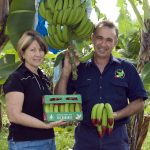A new project aims to offer banana producers the opportunity to increase profitability and growth of exports.
The project will bring a laser-like focus on monitoring and improving handling practices to deliver more predictable fruit quality and reduce waste, during the supply chain process.
Pacific Coast Produce, a cooperative of six growers in north Queensland, has been exporting organic and ecoganic Cavendish bananas to Asian markets by airfreight since 2009. About 10% of their consignments are downgraded or discarded because the fruit arrives over-ripe or chilled. This results in significant lost revenue.
There is currently no temperature monitoring of export shipments, which limits the capacity of supply chain partners to identify when, where and how fruit quality loss occurs. The unpredictable arrival quality of individual shipments is a barrier to future growth of export markets for Australian organic bananas.
A newly commissioned project through the Fight Food Waste Cooperative Research Centre with co-investment from the Department of Agriculture and Fisheries (DAF) and Pacific Coast Produce,
As well as in-kind support from the Australian Food Cold Chain Council, will address this issue by demonstrating the benefits of a regular supplychain monitoring and improvement program.
The project has three elements:
1. Monitoring
Monitoring shipments to record handling temperatures, identify the cause of fruit quality loss and highlight improvement opportunities.
2. Decision support tool
Developing a decision support tool that predicts fruit arrival quality, waste and shelf life based on how bananas respond to variations in shipment conditions.
3. Improving practice
Encouraging adoption of monitoring technology, improved practices and the decision support tool to reduce waste in export and domestic banana supply chains.
The latest generation of low cost remote monitoring technologies will be used to automatically track consignment movement and report shipment temperatures in real-time. Export shipments will be assessed for fruit quality and compared against organic bananas from other exporting countries. This activity will help identify opportunities to improve handling practice to maintain cold-chain integrity and reduce fruit quality loss and waste.
The project will also determine how Cavendish bananas respond to inevitable variations in export conditions through a series of fruit storage trials in the Cairns laboratory of the DAF.
The fruit response will form the basis of a mathematical model that predicts fruit arrival quality, waste and shelf life.
A decision support tool that integrates the monitored supply chain conditions and modelled trial data will be developed to inform handling and marketing decisions.
Targeted chain improvement strategies and resources such as best practice guidelines, a supply chain manual and the decision support tool will be delivered to the banana industry. While the project focus is on exports, lessons learnt from this study are also expected to be relevant for improving the efficiency of the Australian domestic supply chain.
For further information about the project, please visit the Fight Food Waste CRC website: https://fightfoodwastecrc.com.au
The Fight Food Waste Cooperative Research Centre (CRC) gratefully acknowledges the Australian Government Department of Industry, Science,Energy and Resources’ financial contribution through the Cooperative Research Centres program as well as the participants of this project.

